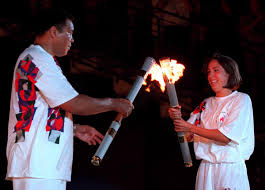
One of the most influential athletes of the 20th century, Muhammad Ali (born Cassius Clay Jr.) was known almost as much for his principled stances and humanitarian efforts outside of the ring as he was for his heavyweight boxing titles. One of the first athletes with a global audience, Ali won an Olympic medal and held the heavyweight title three times while racking up more than 50 wins in a boxing career spanning more than two decades.
Ali also was known for having the courage to standing up for his principles. For example, when Ali refused to join the military during the Vietnam War, he cited his pacifism rooted in his religious beliefs. Although many Americans were skeptical about the draft and the war at the time, he stood out as one of the most prominent figures to voice these opinions.
In 1996, Muhammad Ali capped his remarkable career with an invitation to light the Olympic torch to commemorate the start of the Olympic Games in Atlanta. Despite grappling with a severe case of Parkinson’s disease that caused him to have difficulty in controlling his movements, Ali accepted the responsibility. The moment when he overcame his debilitating symptoms to hold the flame steady and light the torch was one of the great moments in American Olympic history.
 RSS Feed
RSS Feed
